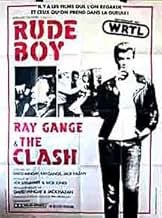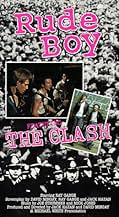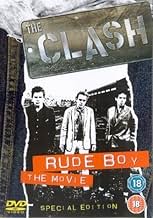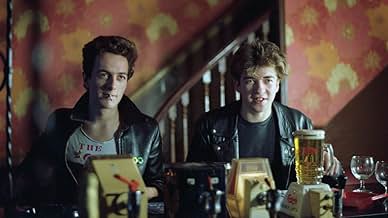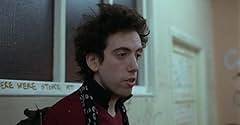VALUTAZIONE IMDb
6,4/10
1775
LA TUA VALUTAZIONE
Un giovane punk e roadie britannico per The Clash naviga nella vita nell'Inghilterra socialmente dilaniata degli anni '70.Un giovane punk e roadie britannico per The Clash naviga nella vita nell'Inghilterra socialmente dilaniata degli anni '70.Un giovane punk e roadie britannico per The Clash naviga nella vita nell'Inghilterra socialmente dilaniata degli anni '70.
- Premi
- 1 vittoria e 1 candidatura in totale
Recensioni in evidenza
7Koli
It is genuinely difficult to work out where the drama ends and the documentary takes over. When I sat down to watch it I had no idea whether Ray, the fan who becomes a roadie, was an actor or the genuine article. The stilted nature of some of the conversations, and self-conscious grins accompanying them, indicate contrivance, but it's as if real conversations are being reproduced for the camera. Only afterwards did I discover that Ray Gange was acting and had written the script.
The film provides an insight into the world of punk rock in the late seventies. The Clash were more musically adept, and more politically aware, than most punk bands of the era, but the rebellious swaggers and the anger were typical enough. The concert footage is entertaining, and only marred by the fact that much is filmed from the back of the stage. It features much of the band's best material, from White Riot to Tommy Gun to London's Burning.
This is a nostalgic treat for old punk rockers, and a useful introduction for those who, in the late 70s, were too young or allowed punk rock to pass them by.
The film provides an insight into the world of punk rock in the late seventies. The Clash were more musically adept, and more politically aware, than most punk bands of the era, but the rebellious swaggers and the anger were typical enough. The concert footage is entertaining, and only marred by the fact that much is filmed from the back of the stage. It features much of the band's best material, from White Riot to Tommy Gun to London's Burning.
This is a nostalgic treat for old punk rockers, and a useful introduction for those who, in the late 70s, were too young or allowed punk rock to pass them by.
Read Marcus Gray's The Last Gang in Town.... I watched the film a couple of times, like other contributors, with many questions in my head about what it was really about, how much The Clash co-operated with it, why the film is presented in the way it is, who on Earth Ray Gange is...
This book clears up those questions... The film is flawed, but as a document of the times, and especially the power of The Clash as a live band (there's not any better footage of them around - although they overdubbed the live tracks).... What a band...
This book clears up those questions... The film is flawed, but as a document of the times, and especially the power of The Clash as a live band (there's not any better footage of them around - although they overdubbed the live tracks).... What a band...
This intriguing film blurs the line between documentary and reality much in the way 60's classics such as "Medium Cool" do. The story (when it's allowed to tell itself) of the drunken directionless punk is sad, charming and wild. I can see why the Clash disowned the film. It shows how they merely reflect the showbiz side of the struggles of the working class in England. When Ray attempts to tell Mick Jones how much "Stay free" means to him, he is shrugged off with a " I'm watching you." We see Ray being consumed by his own nihilstic rage while the clash use it up to the point of making good pop music with it.
...despite copying the musicians in the studio trope, the porn-shop as symbol of capitalism and the black/white subplot. However "Rude Boy" perhaps deserves a little more attention than it seems to have received.
As a 'proper movie' it's kind of a washout. Aiming for an improvised cinema-verite feel, it's hamstrung by a fatal lack of tension, having apparently been assembled by people with little grasp of editing, narrative or any kind of cinematic style. Despite this, the concert footage of The Clash is indispensable to anyone with an interest in the era, and shows why they were one of the all-time great rock and roll bands. We have very few 70's punk bands recorded properly on film as opposed to video and the difference in quality is striking. Also, Joe Strummer's death is still quite recent as I write and seeing him here in his prime is poignant in the extreme.
In general there are very few film documents of punk. We have Jarman's "Jubilee" which was more of a neo-Elizabethan fantasia, "The Great Rock and Roll Swindle" with its McClarenite rewriting of history and come-lately nonsense like "Breaking Glass". "Rude Boy" at least doesn't fall into any narrative clichés (if only by barely having a plot) and by its very lack of creative flair may succeed best in giving a picture of the time. For example, unlike the myth-making of the likes of "Sid and Nancy", this shows punk gigs as they actually were - largely populated by lads with feather-cuts and tank tops.
By concentrating on hanger-on Gange instead of the band itself, the filmmakers turn the story into one of the relationship between the band and its fan-base - pointed up by having Strummer sing "All The Young Punks" right through in the studio without the backing track to distract us from the lyric.
The commentator who said this did not give a true picture of the politics of the time is surely wrong. I was there and it seems pretty accurate to me. We see the resurgent National Front, the Anti-Nazi League, the bullishness and racism of the police at the time (which would shortly lead to the Brixton riots) and the rise of Thatcherism out of the bankrupt Butskellite consensus. Ray Gange's character in the film seems intended to represent the British white working class at the time - confused, politically disengaged and borderline racist, the attitudes which led to the Thatcher victory we see at the end of the film. The left, variously represented by the SWP (bureaucratic) and Strummer (by turns tokenistic and diffident) fails to capture Gange's imagination and it is the right who seize on the desire for change and turn it to their own advantage.
Rude Boy is a strange curate's egg, then. There may have been a really good film struggling to get out of this morass, but we'll never know. The special edition DVD has a "Just Play the Clash" function which lets you view only the concert footage and I suspect this will get a lot of use.
Rating? 3/10 for the story, 10/10 for the music.
As a 'proper movie' it's kind of a washout. Aiming for an improvised cinema-verite feel, it's hamstrung by a fatal lack of tension, having apparently been assembled by people with little grasp of editing, narrative or any kind of cinematic style. Despite this, the concert footage of The Clash is indispensable to anyone with an interest in the era, and shows why they were one of the all-time great rock and roll bands. We have very few 70's punk bands recorded properly on film as opposed to video and the difference in quality is striking. Also, Joe Strummer's death is still quite recent as I write and seeing him here in his prime is poignant in the extreme.
In general there are very few film documents of punk. We have Jarman's "Jubilee" which was more of a neo-Elizabethan fantasia, "The Great Rock and Roll Swindle" with its McClarenite rewriting of history and come-lately nonsense like "Breaking Glass". "Rude Boy" at least doesn't fall into any narrative clichés (if only by barely having a plot) and by its very lack of creative flair may succeed best in giving a picture of the time. For example, unlike the myth-making of the likes of "Sid and Nancy", this shows punk gigs as they actually were - largely populated by lads with feather-cuts and tank tops.
By concentrating on hanger-on Gange instead of the band itself, the filmmakers turn the story into one of the relationship between the band and its fan-base - pointed up by having Strummer sing "All The Young Punks" right through in the studio without the backing track to distract us from the lyric.
The commentator who said this did not give a true picture of the politics of the time is surely wrong. I was there and it seems pretty accurate to me. We see the resurgent National Front, the Anti-Nazi League, the bullishness and racism of the police at the time (which would shortly lead to the Brixton riots) and the rise of Thatcherism out of the bankrupt Butskellite consensus. Ray Gange's character in the film seems intended to represent the British white working class at the time - confused, politically disengaged and borderline racist, the attitudes which led to the Thatcher victory we see at the end of the film. The left, variously represented by the SWP (bureaucratic) and Strummer (by turns tokenistic and diffident) fails to capture Gange's imagination and it is the right who seize on the desire for change and turn it to their own advantage.
Rude Boy is a strange curate's egg, then. There may have been a really good film struggling to get out of this morass, but we'll never know. The special edition DVD has a "Just Play the Clash" function which lets you view only the concert footage and I suspect this will get a lot of use.
Rating? 3/10 for the story, 10/10 for the music.
Rude Boy (1980) follows the life of a youth who dreams about working for his favorite band THE CLASH. The band THE CLASH co-star in this picture and some of their live performances is caught on film. This movie was made before they made it big across the pond. The band is shown working on their second album GIVE THE ENOUGH ROPE. A colleague of their's John Lydon once said that the Clash didn't know how to pace themselves, they would be tired after the first four or five songs. Well, he was right. Some of the concert footage shows, the band appeared to be sluggish and tired in some of their performances. I heard that the band wasn't happy with the way they were portrayed and neither was the young man who played the wannabe roadie. I found the band to be very interesting and I became a Joe Strummer fan after I saw this movie.
The film-makers also capture the turmoil that was occurring on the streets of London during this time. Their was a lot of rioting and protesting. They also capture the collapse of the Labour Party and the rise of the Conservatives. Another one to seal in a time capsule. Interesting, recommended for Clash fans.
The film-makers also capture the turmoil that was occurring on the streets of London during this time. Their was a lot of rioting and protesting. They also capture the collapse of the Labour Party and the rise of the Conservatives. Another one to seal in a time capsule. Interesting, recommended for Clash fans.
Lo sapevi?
- QuizAs an intro Before playing 'White Riot' as bouncers & the audience were fighting at the Glasgow Apollo Joe Strummer says "Simmer down ..Control your temper" . This is the first line from Bob Marley & the Wailers 1963 Jamaican hit single 'Simmer Down'
- BlooperWhen reporting the outcome of the trial, David Mellor is described as "David Mellor QC". Mellor was not made a Queen's Counsel until 1987.
- Citazioni
Lead guitarist: You know what I think, don't you? I've been watching you.
Rude Boy: Yeah, I noticed. Quite a lot.
Lead guitarist: I been watching you.
Rude Boy: I'll keep it in mind.
Lead guitarist: Do.
- Versioni alternativeReleased at 133 minutes in Europe; US prints run 120 minutes.
- ConnessioniFeatured in White Riot (2019)
- Colonne sonorePolice And Thieves
Written by Junior Murvin and Lee 'Scratch' Perry
Sung by Junior Murvin
Island Records
I più visti
Accedi per valutare e creare un elenco di titoli salvati per ottenere consigli personalizzati
- How long is Rude Boy?Powered by Alexa
Dettagli
- Data di uscita
- Paese di origine
- Lingua
- Celebre anche come
- The Clash: Rude Boy
- Luoghi delle riprese
- Camberwell Road, Southwark, Londra, Inghilterra, Regno Unito(procession of Royal cars passes along)
- Aziende produttrici
- Vedi altri crediti dell’azienda su IMDbPro
Contribuisci a questa pagina
Suggerisci una modifica o aggiungi i contenuti mancanti


